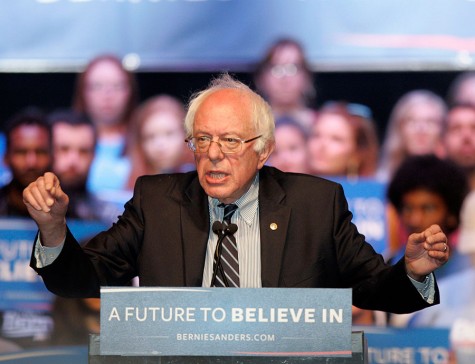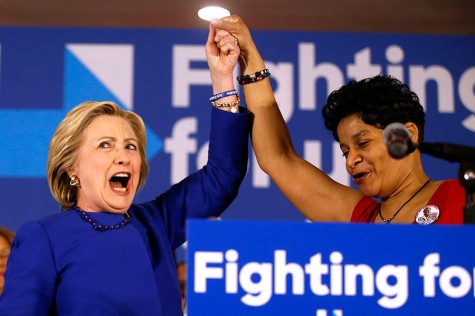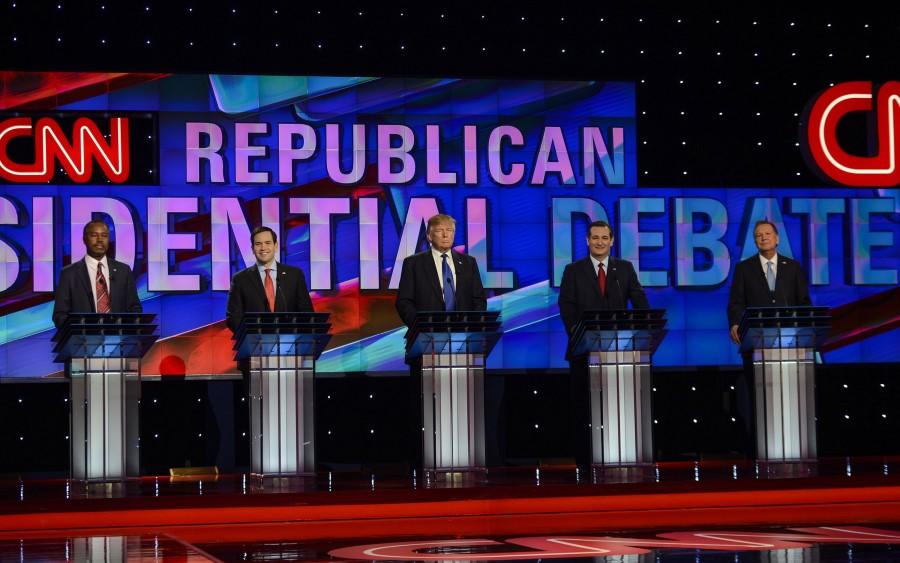The presidential race: An overview
From left, Republican presidential candidates Dr. Ben Carson, Sen. Marco Rubio, (R-FL), businessman Donald Trump, Sen. Ted Cruz, (R-TX), and Ohio Gov. John Kasich, are introduced during a debate sponsored by CNN, Telemundo, Salem Media Group and the RNC at the University of Houston’s Moores School of Music Opera House on Thursday, Feb. 25, 2016.
February 19, 2016
Many BBHS students, especially seniors, will be able to vote in this next presidential election, making it important that Blanchet students stay

Democratic presidential candidate Sen. Bernie Sanders addresses a 6,000-strong rally at the Verizon Theater in Grand Prairie, Texas, on Saturday, Feb. 27, 2016.
informed on the status of the debate, as well as what the candidates say about major policy issues.
This election determines the next president of the United States. The beliefs and policies of the president will be reflected throughout the bureaucracy and will influence legislation that is passed, making the election incredibly significant to students and their families. Students who are turning 18 before November should therefore consider becoming involved in their country’s political affairs by registering to vote.
Students should know that the presidential race is picking up speed, and the 2016 primaries and caucuses have already begun.
Candidates are currently vying to win delegates so that they can receive their party’s nomination. So far in the election, candidates have won delegates from the Iowa Caucus and New Hampshire Primary, which took place on February 1 and 9, respectively.
Republican candidates need 1237 delegates to win the nomination, while Democratic candidates need 2382 to win, according to the New York Times.
Several more primaries and caucuses are coming up in the next few weeks, including the Nevada Democratic Caucus, South Carolina Republican Primary, Nevada Republican Caucus, and the South Carolina Democratic Primary.
These events lead up to the Super Tuesday Primaries on March 1, a day when many US states hold their primary elections. Alabama, Arkansas, Georgia, Massachusetts, Minnesota, Oklahoma, Tennessee, Texas, Vermont, Alaska, American Samoa, and Virginia will award delegates on Super Tuesday, according to the New York Times. Colorado will also have a caucus but the delegates will remain unpledged, and no delegat

A spirited Democratic presidential candidate Hillary Clinton, left, joins Geneva Reed-Veal, the mother of Sandra Bland, during a campaign rally at the Parkway Ballroom on Chicago’s South Side on Wednesday, Feb. 17, 2016.
es will be awarded.
According to the New York Times, the candidates have won delegates as follows:
Republicans: Trump 17 delegates, Cruz 11 delegates, Rubio 10 delegates, Kasich 5 delegates, Bush 4 delegates, Carson 3 delegates
Democrats: Clinton 32 delegates and 449 superdelegates, Sanders 36 delegates and 19 superdelegates
These numbers will change as early as tomorrow, February 20, when the Nevada Democratic Caucus and South Carolina Republican Primary take place.
As for the state of Washington, our turn is coming:
Key Dates for the Presidential Primary and Party Caucuses
- February 20 – Washington State Republican Party Caucuses (for more info: www.wsrp.org)
- March 26 – Washington State Democratic Party Caucuses (for more info: www.wa-democrats.org)
- April 9 – Military and overseas ballots mailed for the Presidential Primary
- April 25 – Deadline to register by mail or online, or update your registration
- May 6 – Presidential Primary 18-day voting period begins / regular ballots mailed
- May 16 – Deadline for new Washington state voter registration (in person only)
- May 24 – Presidential Primary
The presidential race is obviously topical, and focus on the race will intensify as Election Day approaches on November 8th. The outcome of the race will affect America financially, socially, and militarily both domestically and abroad as the new president implements his or her policies.
I will post another update on the presidential race in a few weeks, when candidates have won more delegates. In the meantime, students are encouraged to follow the election to become well-informed of the presidential campaign process, as well as the views of the candidates who are running. 





